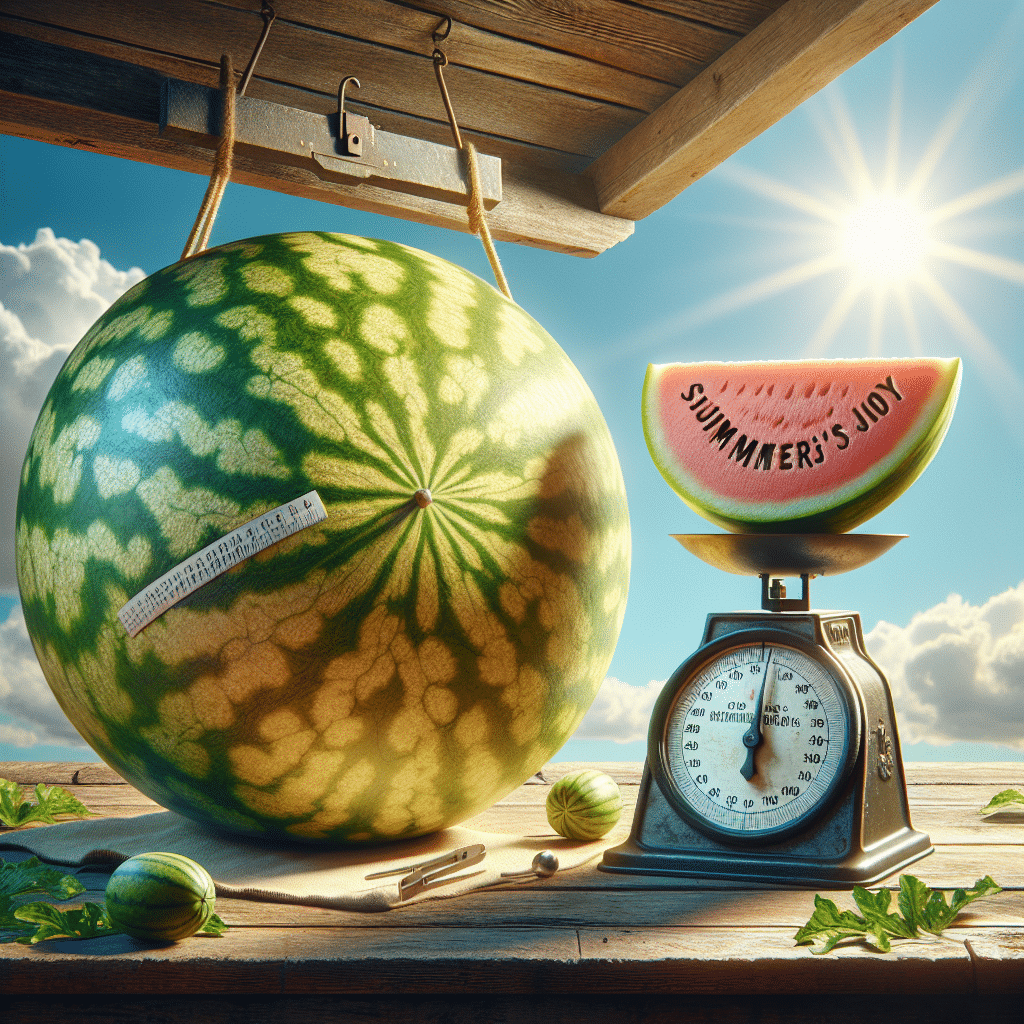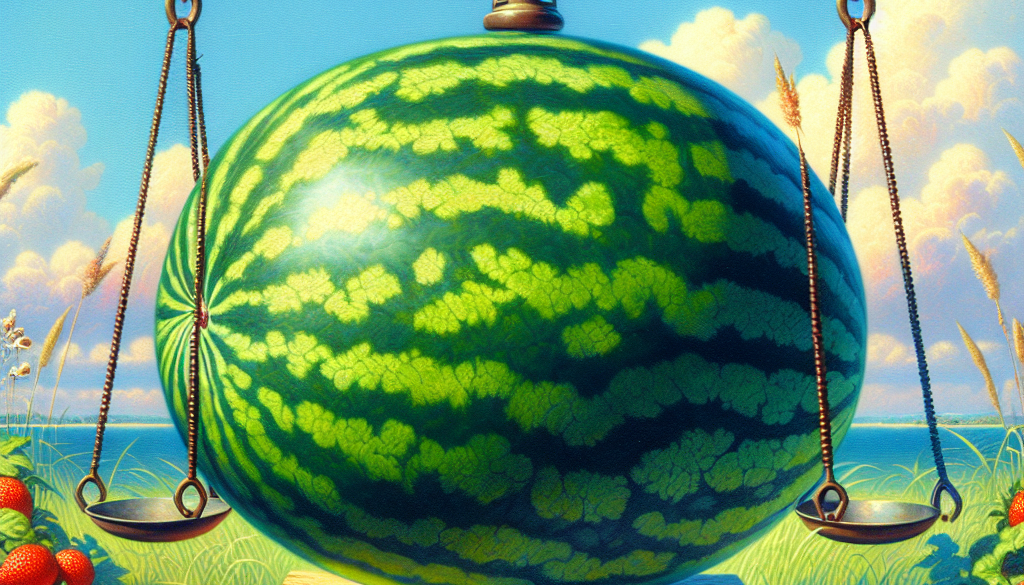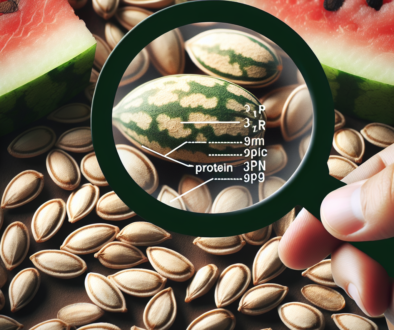Watermelon Weight: How Heavy is Summer’s Joy?
-
Table of Contents
- Watermelon Weight: Unveiling the Heft of Summer’s Favorite Fruit
- Understanding Watermelon Varieties and Their Weights
- Factors Influencing Watermelon Weight
- Why Watermelon Weight Matters
- Case Studies: Record-Breaking Watermelons
- Statistics: The Business of Watermelon Weights
- Conclusion: The Significance of Watermelon Weight
- Discover the Benefits of Watermelon Seed Protein with ETprotein
Watermelon Weight: Unveiling the Heft of Summer’s Favorite Fruit

Watermelons are the quintessential summer fruit, known for their refreshing taste and hydrating properties. But beyond their deliciousness, watermelons are also fascinating in terms of their size and weight. In this article, we’ll explore the factors that contribute to the weight of watermelons, the range of sizes they come in, and why understanding their weight is important for growers, retailers, and consumers alike.
Understanding Watermelon Varieties and Their Weights
Watermelons are not a one-size-fits-all fruit. They come in various shapes, sizes, and weights, influenced by their variety and growing conditions. Here are some common types of watermelons and their typical weight range:
- Personal or Mini Watermelons: These small-sized watermelons weigh between 1 to 7 pounds (0.45 to 3.17 kg) and are perfect for single servings or small families.
- Icebox Watermelons: Slightly larger than personal watermelons, icebox varieties weigh between 5 to 15 pounds (2.27 to 6.80 kg) and fit well in a refrigerator.
- Picnic Watermelons: These are the traditional watermelons that most people are familiar with, weighing between 15 to 45 pounds (6.80 to 20.41 kg).
- Giant Watermelons: For those who love a challenge, giant watermelons can weigh over 50 pounds (22.68 kg), with some record-breaking specimens reaching over 200 pounds (90.72 kg)!
It’s important to note that these weights are approximate and can vary based on the specific cultivar and growing conditions.
Factors Influencing Watermelon Weight
The weight of a watermelon is determined by several factors, including genetics, soil quality, water availability, and climate. Here’s how these elements play a role:
- Genetics: The genetic makeup of a watermelon variety sets the potential for its size and weight.
- Soil Quality: Nutrient-rich soil contributes to the overall health and growth rate of watermelon plants, affecting the fruit’s weight.
- Water Availability: Watermelons are 90-92% water. Adequate irrigation is crucial for developing full-sized, heavy fruits.
- Climate: Warm temperatures and ample sunlight are necessary for watermelons to reach their maximum potential weight.
Growers must carefully manage these factors to produce watermelons that meet market expectations for size and weight.
Why Watermelon Weight Matters
The weight of watermelons is more than just a number; it has practical implications for various stakeholders:
- Growers: Understanding the expected weight of their watermelon crop helps farmers plan for harvest, storage, and transportation.
- Retailers: For retailers, the weight of watermelons affects pricing, display strategies, and inventory management.
- Consumers: Customers often associate the weight of a watermelon with value and freshness, influencing their purchasing decisions.
Moreover, for those involved in competitive growing, the weight of a watermelon can be a matter of pride and a ticket to fame in agricultural fairs and contests.
Case Studies: Record-Breaking Watermelons
Throughout the years, there have been several notable cases of giant watermelons that have captured the public’s imagination. For instance, the current Guinness World Record for the heaviest watermelon is held by Chris Kent from Sevierville, Tennessee, USA, who grew a watermelon weighing 350.5 pounds (158.96 kg) in 2013. These extraordinary examples showcase the potential of what dedicated cultivation and optimal growing conditions can achieve.
Statistics: The Business of Watermelon Weights
The watermelon industry is a significant agricultural sector, with millions of tons produced annually worldwide. According to the Food and Agriculture Organization of the United Nations (FAO), China is the largest producer of watermelons, contributing to a substantial portion of the global supply. The weight of watermelons directly impacts the economics of this industry, influencing everything from yield per acre to shipping costs.
Conclusion: The Significance of Watermelon Weight
In conclusion, the weight of watermelons is a topic that touches on horticulture, commerce, and consumer preferences. From the petite personal-sized melons to the gargantuan giants, watermelons offer a range of weights that cater to different needs and occasions. Understanding the factors that influence watermelon weight can help stakeholders optimize their practices and meet market demands. Whether you’re a grower aiming for a prize-winning heavyweight or a consumer looking for the perfect picnic addition, the heft of a watermelon is an integral part of its appeal.
Discover the Benefits of Watermelon Seed Protein with ETprotein
While enjoying the juicy delight of watermelons, it’s also worth exploring the nutritional benefits of watermelon seeds. ETprotein offers high-quality watermelon seed protein that is organic, non-GMO, and allergen-free. This plant-based protein is an excellent addition to a healthy diet, especially for those seeking vegan protein sources. ETprotein’s products are ideal for various industries, including sports nutrition, weight management, and health and wellness. By choosing ETprotein, you’re opting for a sustainable and nutritious protein alternative that supports your dietary goals.
About ETprotein:
ETprotein, a reputable watermelon seed protein Chinese factory manufacturer and supplier, is renowned for producing, stocking, exporting, and delivering the highest quality organic bulk vegan protein and plant proteins. They include Organic rice protein, clear rice protein, pea protein, clear pea protein, watermelon seed protein, pumpkin seed protein, sunflower seed protein, mung bean protein, peanut protein etc. Their offerings, characterized by a neutral taste, non-GMO, allergen-free attributes, cater to a diverse range of industries. They serve nutraceutical, pharmaceutical, cosmeceutical, veterinary, as well as food and beverage finished product distributors, traders, and manufacturers across Europe, USA, Canada, Australia, Thailand, Japan, Korea, Brazil, and Chile, among others.
ETprotein specialization includes exporting and delivering tailor-made protein powder and finished nutritional supplements. Their extensive product range covers sectors like Food and Beverage, Sports Nutrition, Weight Management, Dietary Supplements, Health and Wellness Products, and Infant Formula, ensuring comprehensive solutions to meet all your protein needs.
As a trusted company by leading global food and beverage brands and Fortune 500 companies, ETprotein reinforces China’s reputation in the global arena. For more information or to sample their products, please contact them and email sales(at)ETprotein.com today.












